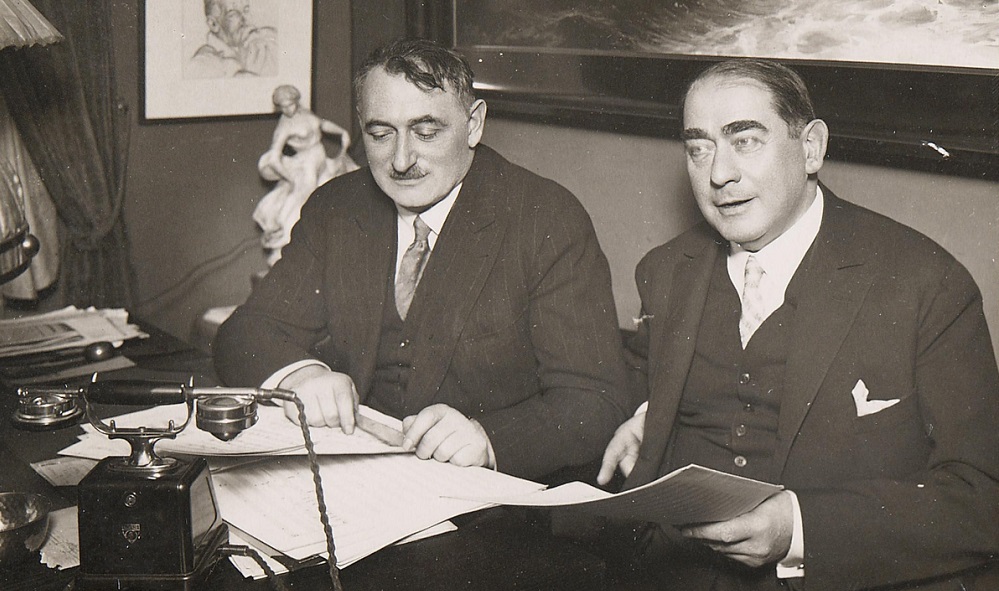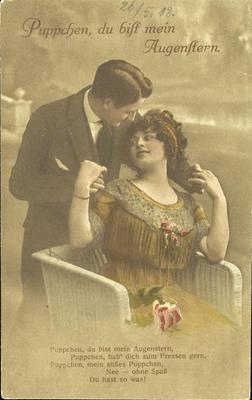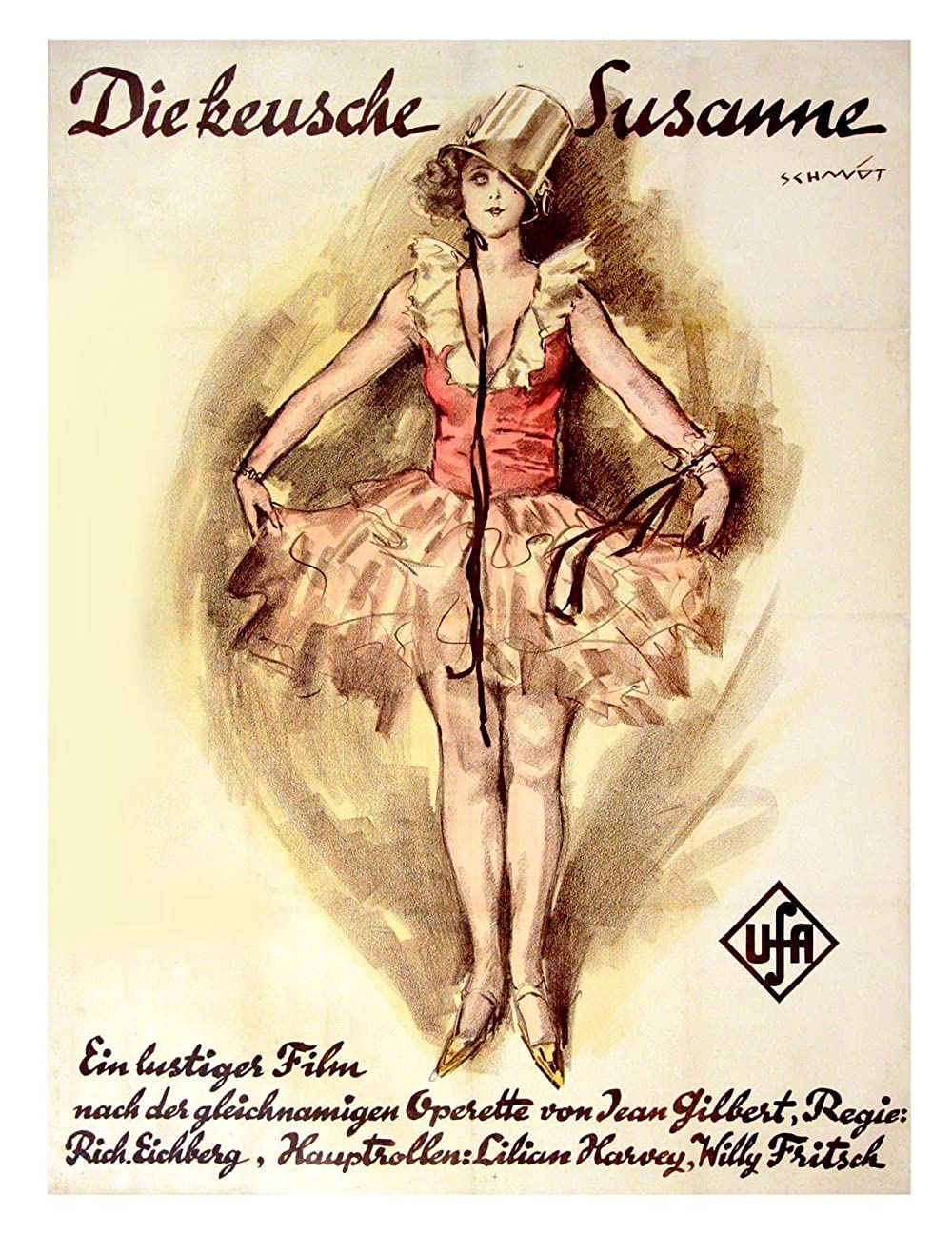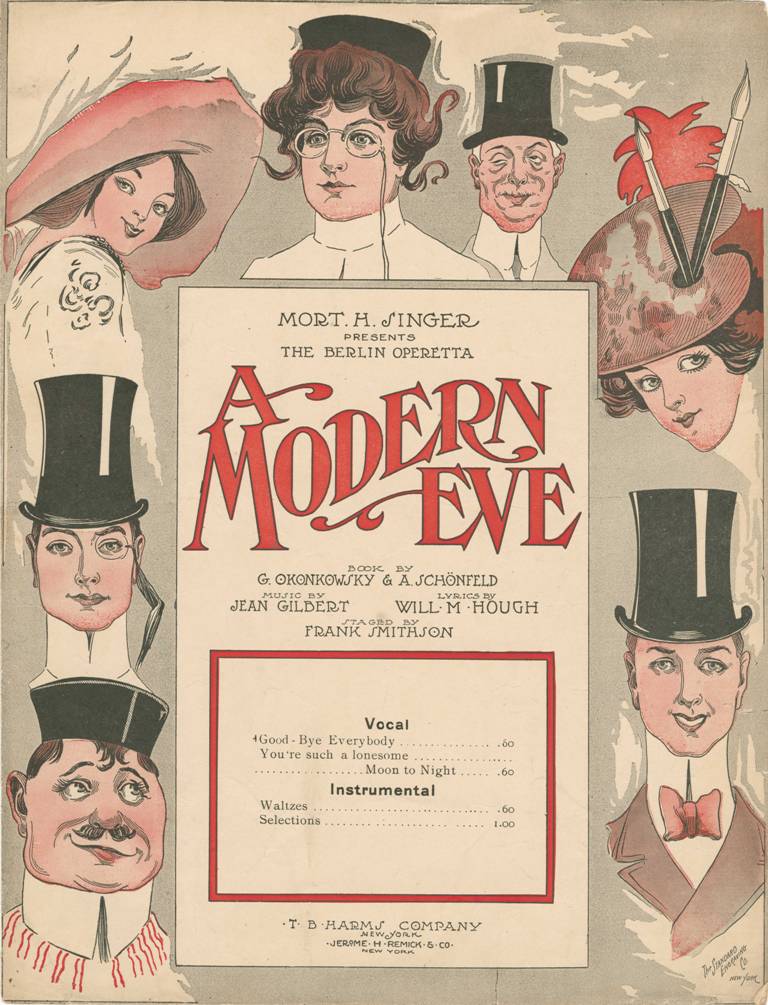Kurt Gänzl
Encyclopedia of the Musical Theatre
9 April, 2022
Gilbert was born as Max Winterfeld in Hamburg, 11 February 1879. He died in exile in Buenos Aires, 20 December 1942. The composer won a brief but enormous world-wide vogue which was interrupted by the First World War.

Jean Gilbert at work with Gustav Charlé. (Photo: Phot. Willinger, Berlin / Theatermuseum Wien)
Winterfeld-Gilbert studied music from an early age in Kiel, Sonderhausen, Weimar and Berlin and became a theatre conductor at the Stadttheater in Bremerhaven at the age of 18. He moved on from there to Hamburg’s important Carl-Schultze Theater and then, in 1900, to the Centralhallen-Theater where his first stage work as a composer, a French vaudeville-opérette based on a Paul de Kock comedy and entitled Das Jungfernstift, was produced in 1901, under his newly acquired and fashionably foreign-sounding pseudonym of Gilbert (pronounce Zjil-bair).

Postcard with the text to “Puppchen, du bist mein Augenstern” by Jean Gilbert. (Photo: Historische Bildpostkartensammlung Prof. Dr. Sabine Giesbrecht / Universität Osnabrück)
The show had sufficient success for it to remain in the provincial lists for a decade and more and it was later seen briefly in America’s German-language theatre (Irving Place Theater, 23 January 1911). Gilbert worked at the Berlin Apollotheater for two seasons, and had his next two theatre works staged in Hamburg, but he lost his musical director’s position in a change of management at the Centralhallen-Theater, and his career regressed as, for some six years, he found conducting engagements only in lesser and provincial venues and even with a circus, and no outlet for his writings. In this time he placed just one work, the short Onkel Casimir at Düsseldorf, and for that he abandoned his posh pseudonym and returned to being plain Max Winterfeld.

Scene from Jean Gilbert’s “Polnische Wirtschaft” with “Fräulein Belladonna & Mr. Bechert”. (Photo: Historische Bildpostkartensammlung Prof. Dr. Sabine Giesbrecht / Universität Osnabrück)
The turning point came with the production of his hugely successful musical comedy Polnische Wirtschaft at Cottbus in December 1909, a success which was followed just two months later by an even more successful musical version of the French play Fils à Papa, produced as Die keusche Susanne at Magdeburg in February 1910. The former of this famous pair ran up a vast first series in Berlin whilst the second proved a major hit not only in Germany but, most notably, in France (La Chaste Susanne), Britain (The Girl in the Taxi) and Spain (La casta Suzanna), and its favourite songs became the hits of the period.

Poster for the 1926 film version of Jean Gilbert’s “Die keusche Susanne”. (Photo: UFA / imdb.com)
This double triumph swiftly earned Gilbert a return to Berlin and a post at the Thalia-Theater where, replacing Viktor Holländer and Max Schmidt as the purveyor of musical scores to Kren and Schönfeld’s texts, he produced a veritable gusher of musical comedies over the next few years, ranging himself alongside Walter Kollo as the most prolific and popular German theatre composer of the era. His output, between 1910 and 1914, included such grand and exportable successes as the revamped metropolitan Polnische Wirtschaft, Autoliebchen (‘Ja, das haben die Madel so gern’), Puppchen (‘Puppchen, du bist mein Augenstern’), Die Kino-Königin (‘In der Nacht’) and Die Tangoprinzessin. Vienna, Budapest (Az ártatlan Zsusi, Lengyel menyecske, A mozitünder, Buksi), Paris (La Chaste Susanne) and New York (Modest Suzanne, The Queen of the Movies, A Modern Eve) all welcomed his works and, following the enormous British success of The Girl in the Taxi, Gilbert became the most sought-after composer in Britain.
His Autoliebchen (The Joy Ride Lady), Fräulein Tralala (Mam’zelle Tralala, Oh! Be Careful) and Die Kino-Königin (The Cinema Star) were all produced in London’s West End in a period of little over three months, but Gilbert’s London career was cut short by the war. Die Kino-Königin was forced out of town at the height of what looked like being a hugely successful run, and George Edwardes, who had purchased the English-language rights to Puppchen and Die Tango-Prinzessin, as well as hiring Gilbert to write the original score for a new musical for the Adelphi Theatre, was obliged to abandon all German-flavoured plans.
Although his most promising overseas outlet was now closed, Gilbert continued to produce regular and mostly successful musical comedies for the German, Austrian and Hungarian stages – Die Dose seiner Majestát, Die Fräulein vom Amt, Arizonda, Die Fahrt ins Glück, Das Vagabundenmädel, Blondinchen, the little Eheurlaub – throughout the First World War, along with scores of songs for some morale-manufacturing patriotic musicals.

Sheet music cover for Jean Gilbert’s “Die Frau im Hermelin”. (Photo: Wiki Commons)
Then, in 1919, he essayed a slightly more substantial score with the romantic Die Frau im Hermelin, and the result was his biggest international success since Die keusche Susanne, with London in particular fêting Gilbert’s return to its stages by welcoming Phyllis Dare as The Lady of the Rose to Daly’s Theatre for more than 500 performances. This was a total reached by only two other West End musicals in the years following the War and prior to the arrival of the fashion for American musicals. One of the two was Vienna’s Lilac Time, the other was Gilbert’s own most wide-flung success Katja, die Tänzerin which, produced in Vienna, followed up its German-language success by triumphing through Europe and from London (Daly’s Theatre, 501 performances) to Australia.
Das Weib im Purpur (played in Hungary as A biborruhas asszony), Die kleine Sünderin (‘In Berlin an der Ecke von der Kaiserallee’, A kis huncut in Budapest) and the small-scale Dorine und der Zufall, which was played for nearly 200 nights at the Theater am Zoo, then at the Artushof-Theater, in Vienna and in Budapest (Dorine és a véletlen), were all produced with success in 1922-3. Geliebte seiner Hoheit was played at the Theater am Nollendorfplatz with Fritzi Massary and in Hungary as A nagy nö, and the Schiller Theater happily hosted Annemarie (‘Durch Berlin fliesst immer noch die Spree!’) before Gilbert, who had sponsored tours of his own works for nearly a decade, began to expand his interests in the business side of the theatre.

Sheet music cover for Jean Gilbert’s “A Modern Eve,” as seen on Broadway.
He formed a firm to set up an ambitious international musical theatre circuit, but his grandiose projects failed and left him in a financially parlous state. He attempted to recoup his losses by writing for the cinema and also by allowing all sorts of depredations to be practised on his works overseas. His name appeared as composer of what was virtually a new musical availing itself of some of his Das Weib im Purpur score, and staged by the Shuberts on Broadway as The Red Robe, and again on a London piece made up of a libretto apparently borrowed from his 1924 Zwei um Eine, some Vernon Duke songs and some of the score of his reasonably successful Uschi, which had already been played in Budapest (Csak egy kislány), all mixed together under the title Yvonne (280 performances).
He also came up with one last new success in Hotel Stadt Lemberg (1929), which reached Broadway as Marching By and Budapest under its original title. However, his best moments as a composer were now past, both at home and in the almost always supportive British theatre where his last representations were sad ones: Edward Laurillard’s production of Lovely Lady (1932) lasted three performances, and a mish-mash called The Girl from Cook’s was unhappily served up at the Gaiety Theatre in 1927 for 34 performances.

Berlin based composer Jean Gilbert in 1913.
In 1933, under the threat of Nazi rule, Gilbert left Germany and went successively to Vienna, where his Die Dame mit dem Regenbogen was produced for 72 performances at the Theater an der Wien, and then, with his career effectively ended, to Paris, London, Barcelona and Madrid before finally emigrating in 1939 to Buenos Aires where he promoted the fourth film of his enduring Die keusche Susanne prior to his death in 1942.

Sheet music cover for Jean Gilbert’s “Wenn die Füßchen sich heben” from “Die keusche Susanne.” (Photo: www.notenmuseum.de)
1901 Das Jungfernstift (Comtesse Marie) (Ernest Quinot ad Max von Ritterfeld) Centralhallen-Theater, Hamburg 8 February
1903 Der Prinzregent (Hans Forsten) Carl-Schultze Theater, Hamburg 12 September
1903 Jou-Jou (Hans Buchholz) Centralhallen-Theater, Hamburg 23 October
1908 Onkel Casimir (as Max Winterfeld/Heinz Gorden) 1 act Apollotheater, Düsseldorf 1 November
1909 Polnische Wirtschaft (Alfred Schönfeld/Kurt Kraatz, Georg Okonkowski) Stadttheater, Cottbus 26 December; Thalia-Theater, Berlin 6 August 1910
1910 Die keusche Susanne (Schönfeld/Okonkowski) Wilhelm-Theater, Magdeburg 26 February; Neues Operetten-Theater, Berlin, 6 August 1911
1910 Die lieben Ottos (Schönfeld/Jean Kren) Thalia-Theater 30 April
1911 Die moderne Eva (Schönfeld/Okonowski) Neues Operettentheater 11 November
1912 Autoliebchen (Schönfeld/Kren) Thalia-Theater 16 March
1912 So bummeln wir (Gustav Kadelburg) Theater Gross-Berlin 21 November
1912 Puppchen (Schönfeld/Kren, Kraatz) Thalia-Theater 19 December
1912 Die elfte Muse (Okonkowski) Operettentheater, Hamburg 22 November
1913 Die Kino-Königin revised Die elfte Muse ad Julius Freund Metropoltheater 8 March
1913 Die Reise um die Erde in vierzig Tagen (Julius Freund) Metropoltheater 13 September
1913 Die Tangoprinzessin (Kren, Kraatz) Thalia-Theater 4 October
1913 Fräulein Tralala (Leo Leipziger/Okonkowski) Neues Luisen-Theater, Königsberg 15 November
1914 Die Sünde der Lulatsch (Hugo Doblin) Centraltheater, Chemnitz 15 March
1914 Wenn der Frühling kommt! (Schönfeld/Kren, Okonkowski) Thalia-Theater 28 March
1914 Kam’rad Manne (Schönfeld/Kren, Okonowski) Thalia-Theater 3 August
1914 Woran wir denken (Franz Arnold, Walter Turszinksy) Metropoltheater 25 December
1915 Drei Paar Schuhe (Schönfeld/Carl Görlitz ad Kren) Thalia-Theater 10 September
1915 Jung muss man sein (Leipziger/Erich Urban) Komische Oper 27 August
1915 Das Fräulein vom Amt (Okonowski, Ernst Arnold) Theater des Westens 13 November
1915 Der tapfere Ulan (Karl Herrmann) Komische Oper 20 November
1916 Arizonda (Felix Dörmann) Apollotheater, Vienna 1 February
1916 Blondinchen (Schönfeld/Jean Kren, Kurt Kraatz) Thalia-Theater 4 March
1916 Die Fahrt ins Glück (F Arnold, Ernst Bach) Theater des Westens 2 September
1916 Das Vagabundenmädel (Schönfeld/Kren, Buchbinder) Thalia-Theater 2 December
1917 Die Dose seiner Majestät (Leo Walther Stein, Rudolf Presber) Komische Oper 7 March
1917 Der verliebte Herzog (aka Der verliebte Prinz) (Okonkowski, Hans Bachwitz) Theater des Westens 1 September
1918 Der ersten Liebe goldene Zeit (Leo Kastner) Zentraltheater, Dresden 8 March, Theater des Westens 20 June 1920
1918 Eheurlaub (Julius Horst, Bachwitz) Liebich-Theater, Breslau 1 August; Apollotheater, Vienna 1 May 1919
1919 Zur wilden Hummel (Kren, Eduard Ritter) Thalia-Theater 19 March
1919 Die Schönste von allen (Okonkowski) Centraltheater 22 March
1919 Die Frau im Hermelin (Rudolf Schanzer, Ernst Welisch) Theater des Westens 23 August
1920 Der Geiger von Lugano (Schanzer, Welisch) Wallner Theater 25 September
1921 Onkel Muz (Bruno Decker, Robert Pohl) Apollotheater, Halle am Saale 2 April
1921 Die Braut des Lucullus (Schanzer, Welisch) Theater des Westens 26 August
1921 Prinzessin Olala (Schanzer, Rudolf Bernauer) Berliner Theater 17 September
1922 Dorine und der Zufall (Grünbaum, Wilhelm Sterk) Neues Theater am Zoo 15 September
1922 Die kleine Sünderin (Hans Hellmut Zerlett, Willy Prager) Wallner-Theater 1 October
1923 Katja, die Tänzerin (Leopold Jacobson, Rudolf Osterreicher) Johann Strauss-Theater, Vienna 5 January
1923 Das Weib im Purpur (Jacobson, Österreicher) Wiener Stadttheater, Vienna 21 December
1923 Der Gauklerkönig (Presber, L W Stein, Zerlett) Komische Opera, Berlin ?April
1924 Zwei um Eine (Jacobson) Theater am Nollendorfplatz 29 February
1924 Geliebte seiner Hoheit (Bernauer, Österreicher) Theater am Nollendorfplatz, Berlin 30 September
1925 Uschi (Leon Kastner, Alfred Möller) Carl-Schultze Theater, Hamburg 24 January; Theater in der Kommandantenstrasse, Berlin March
1925 Annemarie (Robert Gilbert/Okonkowski, Martin Zickel) Schiller-Theater 2 July
1925 Das Spiel um die Liebe (Schanzer, Welisch) Theater des Westens 19 December
1925 Lebenskunstler Zentraltheater, Dresden 25 December
1926 Lene, Lotte, Liese, Josefinens Tochter (w R Gilbert/Okonkowski) Thalia-Theater 14 January
1926 In der Johannisnacht (R Gilbert) Thalia Theater, Hamburg 1 July
1926 Yvonne pastiche of Uschi et al (w Vernon Duke/lib credited to Percy Greenbank) Daly’s Theatre, London 22 May
1927 The Girl from Cook’s (w Raymond Hubbell/R H Burnside, Greatrex Newman) Gaiety Theatre, London 1 November
1928 Eine Nacht in Kairo (Bruno Hardt-Warden, Jacobson) Centraltheater, Dresden 22 December
1928 The Red Robe revised Das Weib im Purpur (H B Smith) Shubert Theater, New York 25 December
1929 Hotel Stadt Lemberg (Ernst Neubach) Deutsches Schauspielhaus, Hamburg 1 July
1930 Das Mädel am Steuer (Schanzer, Welisch) Komische Oper 17 September
1932 Lovely Lady (Zerlett, R Gilbert ad Arthur Wimperis) Phoenix Theatre, London 25 February
1933 Die Dame mit dem Regenbogen (Julius Brammer, Gustav Beer) Theater an der Wien 25 August

So, in the 1910s, Jean Gilbert had started conquering an international market with musicals that were both romantic and peppy. Twenty years later, Paul Abraham had begun doing the same, with musicals that were both tomantic and jazzy. Then it was Nazism that stopped the development of a new musical style. Would Germany have become the leading nation of musical theatre in the 20th century if it hadn’t been for political reasons?
ONLY to say that operettas are just like the splendid sheet music covers that appears above. No new sound, no new mise en scène, nessuna cretinata insomma dei nuovi registi che si sentono sempre, always, in dovere di cambiare le carte in tavola. Yes, I repeat myself, but I’ll do it again!
Louis Casavant, my grandfather appeared in “POLNISCHE WIRTSCHAFT” or The Polish Wedding ” in August 31,1912 at the Empire theater in Syracuse, New York and toured the U.S. in the play.